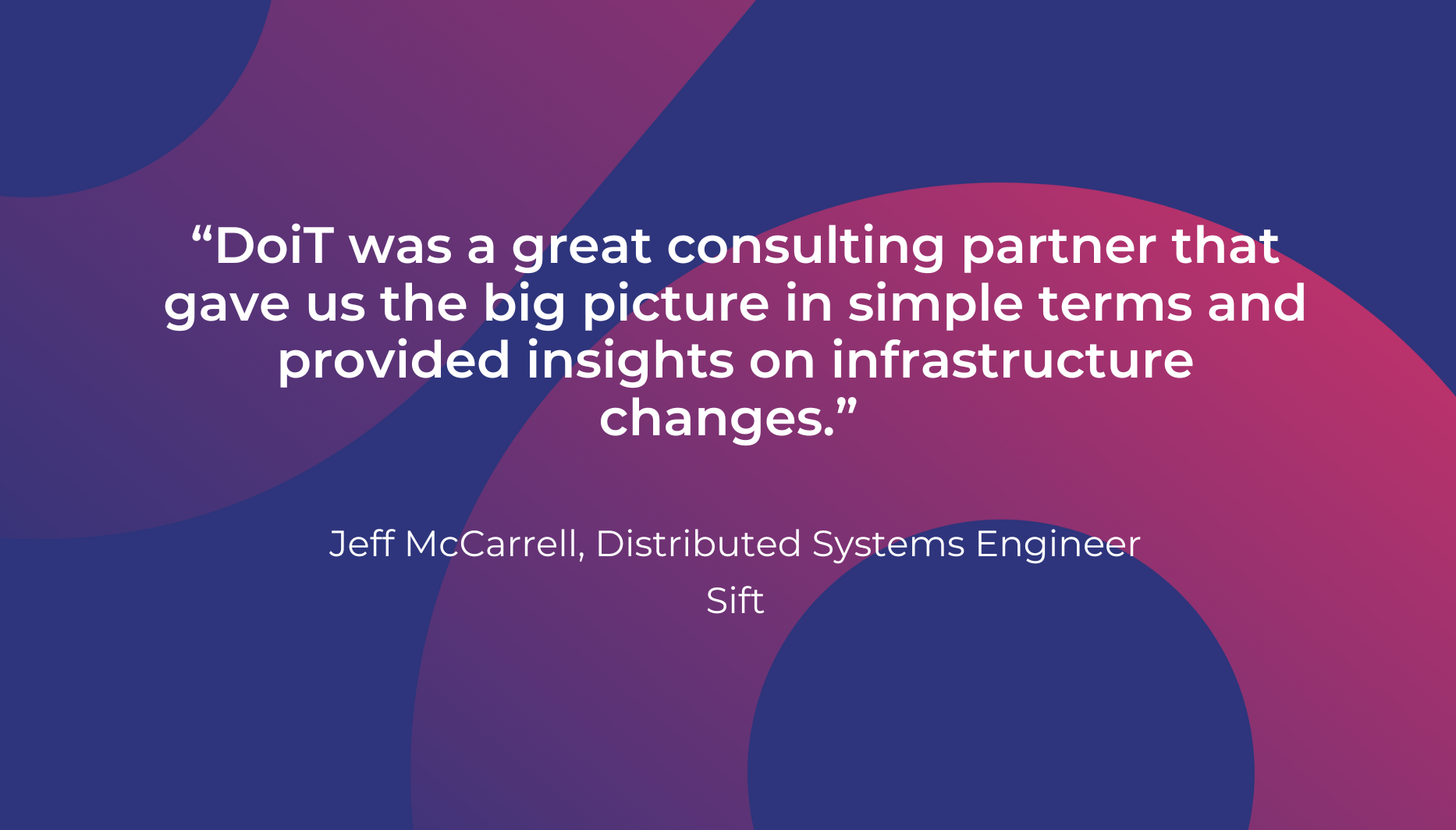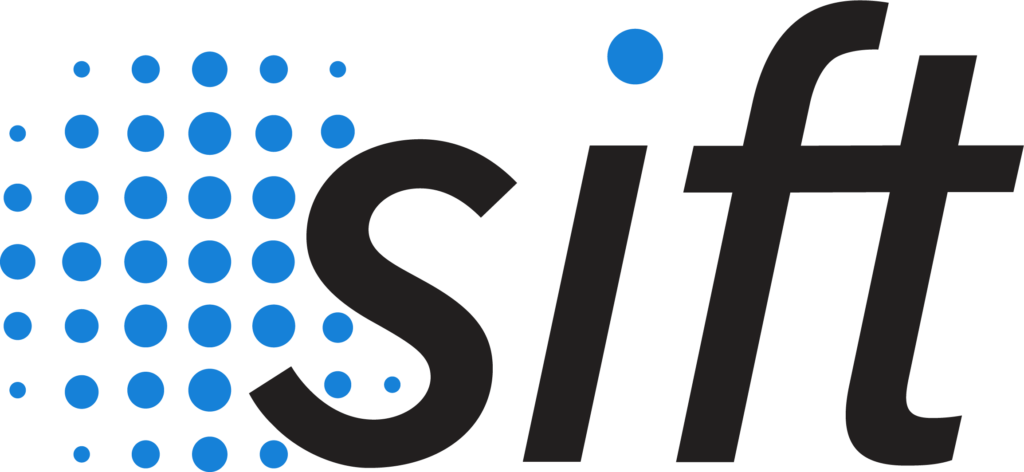How Sift enables instant responses to customers with Google Cloud

Meet Sift
Sift is a digital trust and safety company that leverages machine learning and knowledge from more than 34,000 sites and apps to enhance transaction security and fraud prevention.
With more financial transactions happening online, businesses need the infrastructure to safely manage sensitive information and avoid fraud. Identity theft resulting from data breaches can cause millions of dollars in losses for an organization and jeopardize customer trust.
Sift developed the first machine learning-powered digital trust and safety platform to give companies a way to prevent fraudulent activities. The platform processes huge quantities of customer data to create an accessible and informative history of events to help mitigate security threats by scoring transactions on their risk.
“Rather than taking the commonly used rules-based approach to transaction monitoring and security, we capture a comprehensive history using machine learning that gives much deeper, richer insights,” says Jeff McCarrell, Distributed Systems Engineer at Sift. “Over time, this massive data processing effort allows us to create intelligent features on our platform to benefit everyone using it.”
The challenge
With a lean team of engineers and a growing quantity of stored and processed data, the Sift team recognized the need to transition from its existing data hosting environment and move toward a more scalable option. After positive experiences with Google Cloud, Sift chose to leverage Cloud Bigtable, a NoSQL database, and to partner with DoiT International for enhanced support.
Overhauling the infrastructure
In shifting to Cloud Bigtable, Sift found itself balancing between two clouds. It needed a partner that had deep knowledge of Google Cloud solutions, as well as the best practices involved in making infrastructure changes and migrating core systems to new platforms. DoiT International stepped in to help navigate the solutions available, and offer the best approaches to use them.
“As we were transitioning, DoiT was a great consulting partner that gave us the big picture in simple terms and provided insights on infrastructure changes,” says Jeff.
Sift also had a cumbersome and costly metrics system in place to manage its internal streaming platform. Having helped so many companies with similar system and process refinements, DoiT offered invaluable knowledge to enable Sift to reduce measurement complexities and cloud spend.
The solution
In addition to savings on metrics management, Sift uses reOptimize.io, a cost optimization and reporting tool created by engineers at DoiT, to gain enhanced visibility into its Google Cloud provisioning, use, and spend.
“The production side of our business has about 50 projects running in the cloud, and we chose to have a very granular structure within those,” says Jeff. “DoiT has given us detailed information on those projects and investments, allowing us to target the best areas for improvements.”
Sift was able to leverage DoiT to scale usage up and down for tools like Google Cloud Storage and Cloud Bigtable, further containing costs and maintaining the responsiveness and reliability it needs to support customer demands.
“In using our tools to optimize cost and project management within Google Cloud, Sift was able to better evaluate processes, organize committed use discounts properly, and more,” says Zachary Almeida-Beers, a Technical Account Manager at DoiT International. “Since they are a Y Combinator company, this is vital to their success, as growth depends on strong spending practices and eliminating waste.”
The combination of engineering support and financial visibility has made DoiT a trusted partner for Sift, as the two work together to improve machine learning pipelines, data management processes, and other activities.
Achieving platform excellence
With Google Cloud and DoiT support, Sift is making powerful refinements to its platform. Cloud Bigtable acts as the company’s primary datastore and offers the horizontal scaling needed to manage data processing demands as they come in.
“If we can’t horizontally scale the primary data store, we cannot grow as a company,” says Jeff. “That was a big win in adopting Cloud Bigtable.”
Sift’s services are hosted on dedicated VM instances through Google Compute Engine, while the company is in the early stages of using Google Kubernetes Engine to support machine learning procedures and the Kafka cluster that provides queuing between services. This combination of solutions has created the foundation Sift will need to maintain a consistent global datastore without needing to manage replication and consistency.
Cloud Monitoring provides further transparency within Sift’s new metrics system, and the company is now moving toward Cloud SQL. With its online data processing successfully occurring with millisecond-level response times in Google Cloud, Sift is also standing up Dataproc clusters and building out Dataflow usage as it migrates more projects from its previous cloud provider.
The result
“Now that we’re using the Google Cloud network, we have seen a marked decrease in latency to our endpoints, which is critical,” says Jeff. “Our customers need instant responses, and low-latency enables us to meet that demand.”
Expanding services for a safer web experience
“Our mission is to make the internet safer for everyone, and that mission changes as threats evolve and customer behaviors shift,” says Jeff. “Google Cloud and DoiT have helped us scale and focus our engineering efforts on delivering value instead of IT management. That is a huge win for us.”
Data security and digital trust increasingly rely on machine learning and artificial intelligence, as powerful analytics reduce risk. To deliver the most benefits to the average business owner, though, visualizations have to be intuitive and easy to use. Sift plans to continue building up its vertical product offerings in the coming years to support customer needs.
What's next?
“We want to accelerate service development and delivery, shortening the cycle from data ingestion and model building to production to deliver insights immediately,” says Jeff. “Google Cloud is the best solution for us, and DoiT is the best partner, to achieve that speed and depth we need.”
